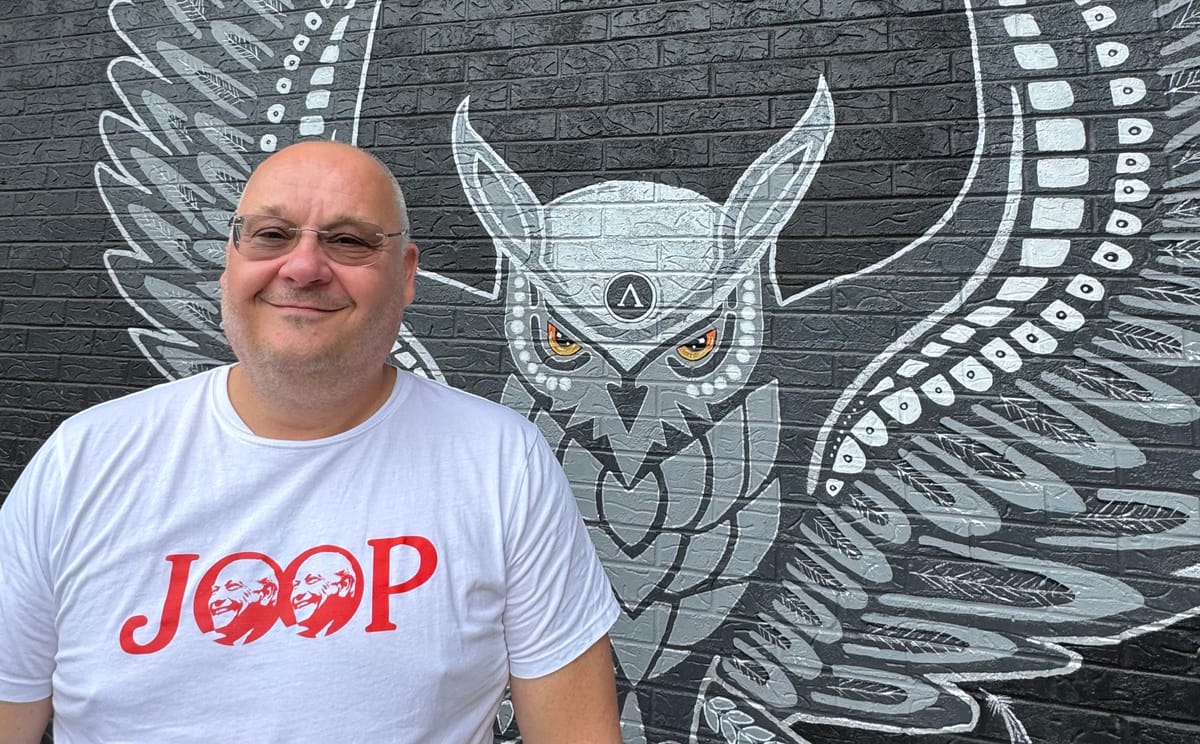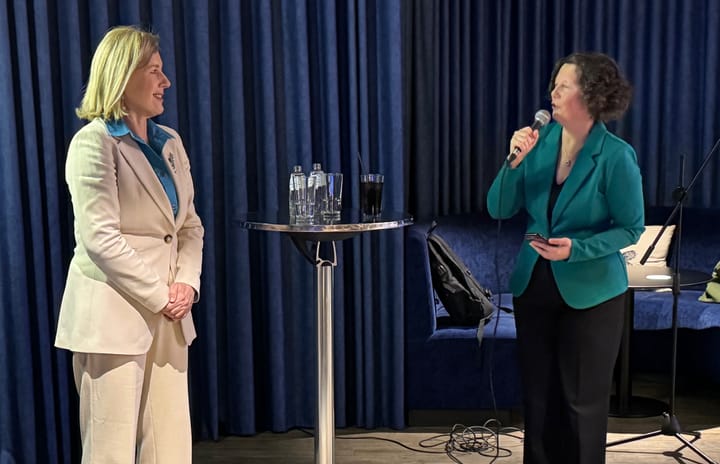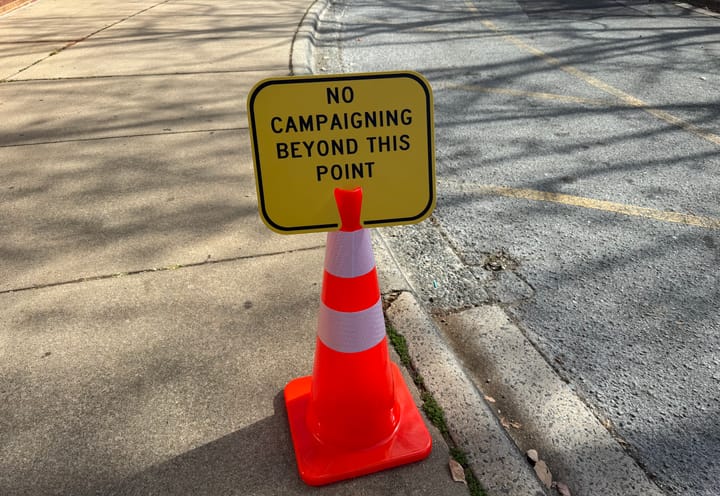Cas Mudde: "I have never seen a campaign like this one in my lifetime - not even close."
On the final Sunday before the US presidential election, I went to the Southern US college town of Athens, Georgia, to get Cas Mudde's take on the campaign and on what's next. Mudde is a Dutch political scientist and scholar best known for his work on political extremism, populism and the far-right.

On the final Sunday before the US presidential election, I've come to the Southern US college town of Athens, Georgia, to get Cas Mudde's take on the campaign and on what's next. Mudde is a Dutch political scientist and scholar best known for his work on political extremism, populism and the far-right. He is professor of international affairs and distinguished research professor at the University of Georgia, his academic home for the last twelve years.
Right-wing hipsters
We're meeting at Akademia Brewing Company, a self-styled "brewpub" staffed by twenty-something hipsters. As we sit down, Mudde warns me not to take this as a sign that we're in left-wing territory. "The South also has hipsters, right-wing hipsters. The sign at the entrance states that emergency service workers get free beer here. That suggests it’s more of a right-wing place. Then again, they once had a transgender waitress here, which makes it less likely to be a right-wing place."
Georgia is known as a red state, which in US political terms means Republican. But Mudde rejects that descriptor. "Georgia isn’t a red state. It’s a purple state, dominated by Republicans. That’s why I prefer to say GOP-dominated or Republican-dominated states. Many of these states aren’t majority Republican. In Georgia, Republicans have a two-thirds majority thanks to gerrymandering. The actual difference between the two parties is only a few percentage points."
Unhinged
As Americans prepare to choose between Kamala Harris and Donald Trump, Mudde admits to feeling nervous. "You can sense that something is changing. There’s a kind of revenge campaign going on, and it’s difficult to deal with. Rationally, you know what might happen, and also that it doesn’t have to happen. As a White man, I’m relatively protected. I check almost all the boxes, to use a Dutch phrase. I’m just not a US citizen. I’ve been studying the far-right phenomenon for three decades, and I have never seen a campaign like this one in my lifetime - not even close. The racism is so explicit; the authoritarian threat is so explicit. Trump is completely unhinged, and there’s no one or anything keeping him in check. And that’s hard. Most people just aren’t focused on it. Even my wife, who is also a political scientist, doesn’t think about it much. She sees the Trump threat but doesn’t think beyond that; it’s a form of self-protection."
Mudde has a 'no politics' rule with his in-laws. "It’s the only way to get through Thanksgiving. Most of my students have the same rule. That’s how Americans live. Many Americans adhere to a ‘no politics’ rule. Everyone says Americans live in bubbles, but that’s rarely true. Even in New York, Trump still gets 30-40% of the vote. You only live in a ‘liberal bubble’ if you are utterly blind to your surroundings."
Terrified
A lot has changed since he first came to the US, Mudde says. "What I always found remarkable about this country was its optimism, which is quite different from Europe, especially my home country the Netherlands. That optimism has vanished. This is a very pessimistic generation, and rightly so. When I started teaching international politics here, my students all wanted to work for the State Department. Now, they go to Deloitte. They’d still like to work for the State Department but worry about low pay or Trump being in charge. Or they’re right-wing and have a negative view of government. There’s little optimism. They don’t see politics as a way to improve their lives. Everyone primarily looks out for themselves. They do have ideals, like fighting climate change or protecting LGBTQI+ rights, but that all happens outside of party politics."
Mudde believes Trump gives a voice to people on the right who feel unable to speak up, including some of his own students. "Most are terrified of admitting they’re right-wing in what they perceive to be a left-leaning environment. My right-wing students never speak up in class. They think the university is run by the left, that's it’s full of cultural Marxists. So, when there’s someone like Trump who goes in all guns blazing, it’s appealing. What they’re looking for is a battering ram, and that’s what he is."
Guns
Two years ago, Georgia joined a number of other Republican-run states in banning schools from teaching "divisive" academic concepts about racism. The new rules don't apply to universities, but Mudde says there is still a significant degree of self-censorship. "People may pretend they’re fearless, but I censor myself too. Sometimes it’s just not worth it. Why risk angering those above me?"
Mudde and his American wife have two young children. What's it like bringing them up in the US in the current political climate? "My son could recite the ‘Pledge of Allegiance’ at age three. It was one of his first phrases. I find that absolutely bizarre but don’t go on about it. It’s just the context we find ourselves in. Most schools in Georgia are integrated, but children play in racially segregated groups. Most Black children stick with Black friends, most White children with other White children. The children in my son’s immediate circle share the same values, but we remain vigilant. For example, when my son wants to play at a friend’s house, I need to consider: are there guns there? It’s a realistic concern and an uncomfortable topic."
Crypto bros
I ask Mudde what he thinks will happen on Election Day. "It’s all guesswork. You can’t trust polling averages. The number of fake polls has surged. Betting markets are influenced by a few crypto bros. Pollsters engage in ‘herding,’ adjusting their results to match those of others. I don’t think it will be very close. I’m convinced Harris will win the popular vote by over 3%, but Trump could still win the Electoral College by a significant margin.
"There may be more swing states than we think. The potential Democratic electorate is much larger than the Republican one, but Republican enthusiasm is high. We don’t know how enthusiastic Democrats are. There are signs that many people are finally realising what’s at stake - people with concerns about Gaza or other issues now see that the alternative is worse, so they may end up voting for Harris. If that happens, she’ll win convincingly, but it’s often groups that don’t vote much - minorities, young people. If Harris wins, it will be thanks to women. In Georgia, Black women are the backbone of the Democrats; 82% of them vote Democratic and play a crucial role in mobilising others."
National guard
And what will happen after the election? "That depends on who wins. If Trump wins, not much will change. Democrats will acknowledge the result, even if there are irregularities. There may be demonstrations, but little violence, perhaps only isolated incidents. If Trump loses, some state electoral boards might refuse to certify results. There will be lawsuits and possibly violence, but not an armed insurrection like in January 2021. Biden is in the White House now. He would deploy the National Guard, and that would be the end of it.
"In 2020, there were no preparations. Now there are emergency plans, including for protecting election workers. Legal battles could be tough. Much depends on how big a potential Harris victory margin is. If it’s close, involving only a couple of states, things could be difficult. If it’s four or five states, it won’t matter - it won’t gain momentum. But if it comes down to, say, Georgia, where Republicans control the Supreme Court, we could face a different situation. But I absolutely don’t expect a civil war."
Free but unfair
Mudde says it’s striking how nonchalantly the country views political violence. "Trump has been shot at once and lightly injured. Someone else was arrested for planning to shoot him. There have been three shootings at Democratic offices in Arizona. In any other country, the campaign would be about political violence, but here it’s just ‘whatever.’ That’s partly because Trump was targeted, not Harris. If it had been Harris, it would have been a much bigger story. Apparently, the left has a certain tolerance for violence. Few have sympathy for Trump; there’s an attitude of ‘it’s your own fault—you wanted those guns, so this is what happens.’ We’re so used to violence that it’s become normal. Just 35 km from here, there was a school mass shooting. Some of my students attended that school. It’s a one-day news item, then it's back to business as usual. The tolerance for violence in this country is surreal."
Mudde does not think that a Trump victory would herald the end of democracy in the US. "Even if Trump wins, there will still be elections in four years, thanks to the US Constitution. The American political system is very complex and was designed not to function. It’s incredibly hard to amend the Constitution. This is different from Hungary under Orbán, where the system is simple and allowed for constitutional changes. The US federal system gives a lot of power to the states. While the US Supreme Court is pro-Trump, it doesn’t agree with everything he does. There would likely be ‘free but unfair’ elections in 2028, and the Democrats would not win them. Eventually America would return to democracy, but it would take some time.
Operation Wetback
"Make no mistake, for marginalised groups like LGBTQI+, African Americans, and Hispanics, life would become very difficult. Legal protections won’t be guaranteed. If mass deportations occur, large numbers of legal migrants and even citizens will be deported, as happened in the early 20th century with Operation Wetback. People who are or appear Hispanic will face harassment and be asked for identification. It will be especially horrible for transgender people, who are already the group facing the most violence per capita. White people in decent financial positions won’t feel much of a Trump administration’s effects. I don’t expect to lose my job, even if I continue to speak out; that risk is low.
Finally, what would be the impact of a Trump victory on Europe? "It would be significant. It’s not that people will vote for leaders like Meloni or Wilders just because Trump wins, but it will be vital for the normalisation of the far right. Meloni could become one of Europe’s most important leaders. Orbán’s entire EU presidency hinges on a possible Trump victory; he even plans to end it with a major event featuring Trump. In France, Le Pen won’t face accusations of isolating the country. She’ll argue, "we are the zeitgeist - under my presidency, we’ll have a better relationship with America." Far-right mainstreaming and normalisation will increase. But most of that has already happened."



Comments ()